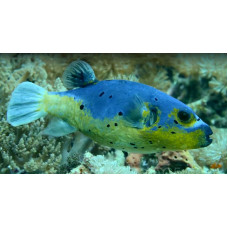Latin name
Arothron nigropunctatus
Other name
Dog-faced puffer
Identification
Their body is oval and relatively elongated, covered with barbs. The skin is not covered with scales. The fish does not have a lateral line. The snout is short, with two pairs of nostrils, and the mouth with four strong teeth is located at the end.
Features of fish fins
The fish does not have a pelvic fin. The dorsal and anal fins are small, symmetrical and located at the end of the body. Dorsal spines (total): 0; Dorsal soft rays (total): 10-11; Anal spines: 0; Anal soft rays: 10-12.
Fish colouring
Background coloration varies and may be gray, tan, bluish, dark bluish, light yellow, orange-yellow, and sometimes bicolored, such as bluish and yellow. Dark coloration is seen around the eyes and mouth. The skin is covered with dark patches that vary in size and shape.
Distribution
Widespread in tropical waters from the Indian Ocean to the central Pacific islands, roughly corresponding to the Indo-Pacific region, excluding the Red Sea.
Habitat
It lives near the outer slopes of reefs and lagoons from the surface to a depth of 25 m (82 ft).
Size
The fish is small in size, reaching 33 centimeters in length.
Behavior
They are diurnal. They live alone. Territorial. To deter potential enemies, they can inflate their bodies by swallowing air or water.
Food and feeding habits
They feed on benthic invertebrates, sponges, algae, acropora, crustaceans and mollusks.
Reproduction
Oviparous.
Fishing
This species is commercially important in fisheries.
Relationship with a person
Contains the deadly toxin tetrodotoxin, which protects it from predators.
| Classification | |
| Phylum | Chordata |
| Class | Actinopterygii |
| Squad | Tetraodontiformes |
| Family | Tetraodontidae |
| Genus | Arothron |
| Species | A. nigropunctatus |
| Features | |
| Conservation status | Least Concern |
| Habitat | Pelagic |
| Life span, years | No information |
| Maximum body weight, kg | No information |
| Maximum length, cm | 33 |
| Sailing speed, m/s | No information |
| Threat to people | Not edible |
| Way of eating | Planktonophage |
Blackspotted puffer
Tags: blackspotted puffer



